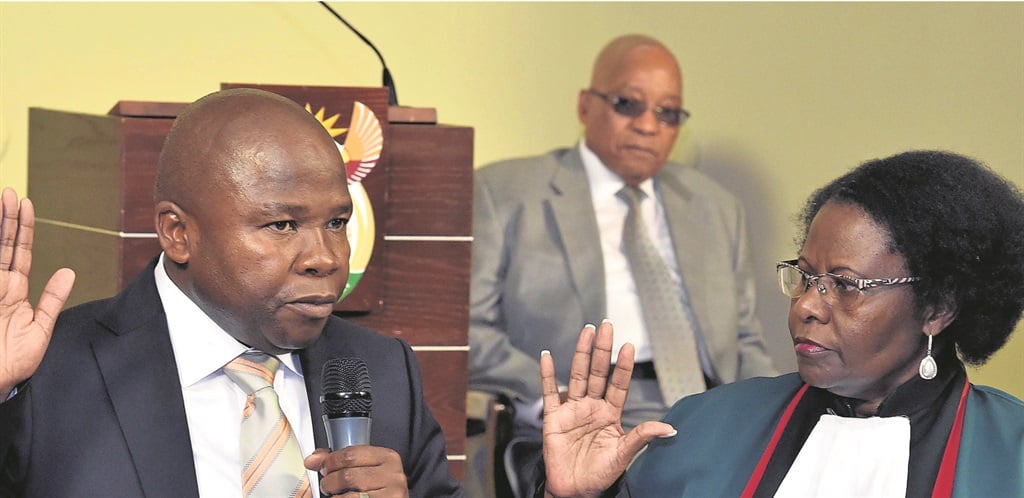
Pieter du Toit: Four years on and Zuma’s dismissal of Nene still grates

The rand tanked, government bonds were sold and South African bank shares tumbled. The ANC was powerless, Cabinet was blindsided and good governance destroyed. Zuma became the president-king, accountable to nobody except the family in Saxonwold, writes Pieter du Toit
If there's anything that the government and party of former president Jacob Zuma will be remembered for – apart from corruption, mismanagement and theft – it will be the brazen manner in which the capture clique attempted to hijack National Treasury.
On Monday it is exactly four years to the day that the presidency issued a statement just after 20:00 in the evening announcing the dismissal of then Finance Minister Nhlanhla Nene and the identity of his replacement, an unknown backbencher called Desmond van Rooyen.
Earlier on that Wednesday, Nene, accompanied by Lungisa Fuzile, Treasury's director general, as well as other senior officials, briefed Cabinet on the status of the budgeting process, which by mid-December is largely approaching finalisation ahead of its tabling in February.
By then Nene and his Treasury team had been under increased political pressure in Cabinet and from the ANC.
Two days before the Cabinet meeting they attended a meeting of the nuclear sub-committee of Cabinet – chaired by Zuma – and got the distinct impression they were the enemy.
Treasury had resisted all attempts by Zuma and his acolytes – David Mahlobo (minister of state security) and Tina Joemat-Pettersson (minister of energy) included – to push for a deal on a multi-year, multi-generation and multi-billion-rand nuclear deal.
When they departed the meeting Zuma ominously remarked to the Treasury officials: "Your last minister (Pravin Gordhan) also defied me in many ways."
On the Wednesday, after the Cabinet meeting, officials including Fuzile, Michale Sachs (head of the budget office) and Dondo Mogajane (the current director general) went back to the department's office in Madiba Street to mull over the day's events, bleakly opining that there didn't seem to be a lot of focus by ministers in finalising the budget.
Nene, driving to the gym after the conclusion after Cabinet, was called back to the Union Buildings for an urgent meeting with Zuma.
When he got to the president's suite of offices in the western wing of the old sandstone building, he was ushered into Zuma's office where he was told he was being redeployed to the still-to-be-established Africa branch of the Brics Development Bank.
"We need someone senior," he told an astonished Nene.
Fuzile, driving home from Treasury after tying up some loose ends at the office, received a call from a member from the ANC's executive committee, who told him that he will soon be receiving a "Gupta minister".
The call was followed by a text from Nene, saying simply: "The axe has fallen."
They'd expected it.
The next 96 hours must surely rank as some of the most bizarre in the whole of South Africa's political history, as Zuma installed someone hand-picked by him and the Guptas to breach Treasury's defences and open it up to pillaging, plundering and theft.
Fuzile – deeply concerned, very suspicious and at high-alert – reached out to the new minister to enquire about when he will be arriving at 40 Church Square, the minister's offices in central Pretoria.
Nene attempted to reached out to ensure a smooth handover. Both men's attempts were spurned, and after a grinning and chuffed Zuma presided over Van Rooyen's oath of office the following day, Van Rooyen decamped to Treasury with new advisers in tow.
It turned out those advisers were seconded from a Gupta-linked company, Trillian Capital Partners, and were despatched to Van Rooyen with a very specific brief.
One of the first things they did was to kick out the minister's chief of staff from his office and start searching for documents, including those related to an SAA deal with Airbus, which Zuma's friend Dudu Myeni (then chair of the SAA board) wanted concluded.
Van Rooyen didn't know his advisers, Fuzile didn’t know them and nobody else at Treasury knew them.
But Zuma's friends, the Guptas, knew them and with the fall of Treasury, the last of those departments who resisted capture, was brought under the heel of the jackboot of capture.
The rand tanked, government bonds were sold and South African bank shares tumbled.
The ANC was powerless, Cabinet was blindsided and good governance destroyed.
Zuma became the president-king, accountable to nobody except the family in Saxonwold.
The decision was rescinded after four frantic days during which bankers, politicians and international figures intervened to convince the ANC that absolute disaster was looming.
The damage was limited, but four years, four finance ministers and four budget cycles later South Africa is still counting the cost of Zuma's cynical, dishonest and corrupted decision to attack his own finance minister.